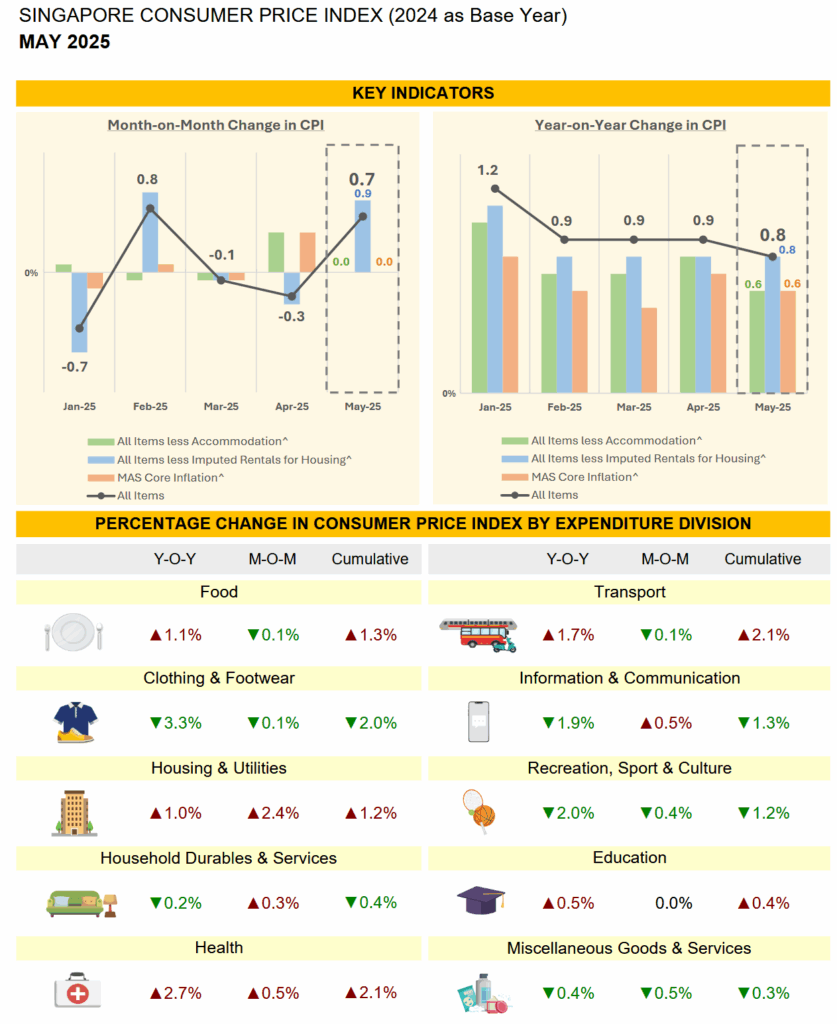Singapore’s inflation eased in May 2025, with both core and headline measures aligning with economists’ expectations, according to data released on 23 June by the Department of Statistics (SingStat).
Core inflation, which excludes accommodation and private transport, moderated to 0.6% year-on-year in May, down from April’s 0.7%.
Headline inflation, which includes all components, dipped to 0.8% from 0.9% in April, also in line with projections. On a month-on-month basis, core inflation remained unchanged, while headline inflation rose by 0.7%.
The Monetary Authority of Singapore (MAS) and the Ministry of Trade and Industry (MTI) attributed the inflation moderation to slower increases in food and private transport costs. They also noted that Singapore’s imported inflation remained moderate, despite recent global oil price increases.
“Although the trade conflicts and the increase in global energy prices could be inflationary for some economies, their impact on Singapore’s import prices is likely to be offset by the disinflationary drags exerted by weaker global demand,” MAS and MTI said in a joint statement.
Food inflation dropped to 1.1% in May from 1.4% in April, mainly due to slower increases in non-cooked food prices. Within the food category, seafood prices declined significantly, with a 3.1% year-on-year fall, and fruits and nuts also saw a 2.9% year-on-year increase but a sharp 3.8% monthly drop.
Electricity and gas inflation also eased, falling 3.7% year-on-year, compared to April’s 3.5% decline. This was due to a larger fall in electricity prices.
Retail and other goods prices continued to decline, though the fall moderated to 1.0% in May from 1.2% previously. Price increases in household appliances helped offset the smaller fall in personal effects costs.
Private transport inflation grew at a slower pace of 1.1%, compared to April’s 1.3%, as car prices rose more modestly. Services and accommodation inflation remained unchanged at 1.1% each.
The health sector experienced a 2.7% year-on-year increase, driven largely by a sharp 13.8% rise in health insurance costs. Meanwhile, clothing and footwear prices fell 3.3%, and recreation and culture expenses dipped by 2.0%.
Domestically, labour costs are expected to rise gradually. However, government subsidies for essential services are likely to continue dampening services inflation.

MAS and MTI project core inflation to average between 0.5% and 1.5% in 2025, although they caution that rising external risks may introduce volatility.
The CPI data, based on the new 2024 base year, reflect updated expenditure weights drawn from the 2023 Household Expenditure Survey. The CPI basket now includes 6,800 items across ten main categories, priced at 4,500 outlets islandwide.
The government publishes three inflation measures: headline CPI, CPI excluding accommodation, and MAS Core Inflation (which also excludes private transport). Imputed rental costs, forming a large part of accommodation expenses, do not directly affect most households’ cash outflows and are thus excluded from core measures.
The post Singapore’s inflation eases in May amid slower food and transport price growth appeared first on The Online Citizen.


